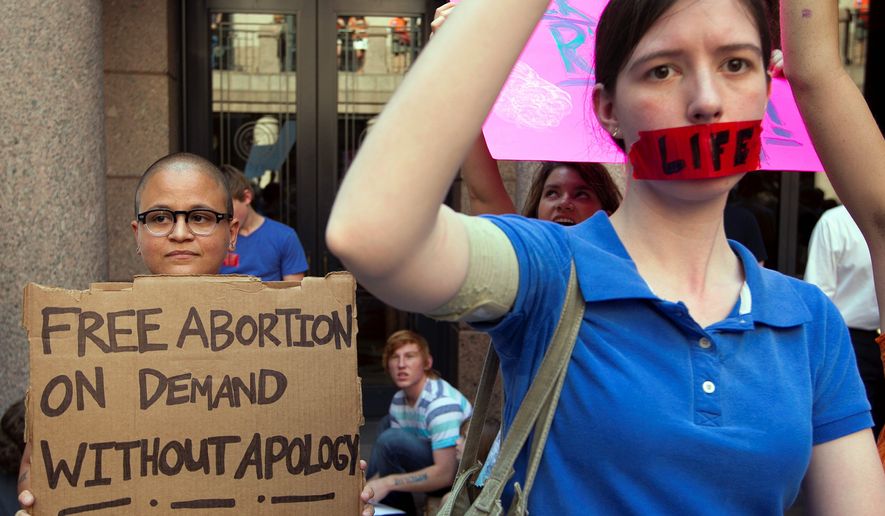The Supreme Court is giving an election-year hearing to a dispute over state regulation of abortion clinics in the court’s first abortion case in eight years.
The justices said Friday they will hear arguments, probably in March, over a Texas law that would leave about 10 abortion clinics open across the state.
A decision should come by late June, four months before the presidential election.
The issue split the court 5-4 the last time the justices decided an abortion case in 2007.
The case tests whether new standards for abortion clinics and doctors are reasonable measures intended to protect women’s health or a pretext designed to make abortions hard, if not impossible, to obtain.
Texas clinics challenged the 2013 law as a violation of a woman’s constitutional right to an abortion.
Terry O’Neill, president of the National Organization for Women, urged the high court to overturn the laws, which she said set “impossible and medically unnecessary standards for health care providers.”
“When the leading medical groups like the AMA oppose these laws, you have to ask yourself what they are really about,” said Jennifer Dalven, director of the American Civil Liberties Union’s Reproductive Freedom Project, noting that the American Medical Association and the American College of Obstetricians and Gynecologists have filed briefs with the Supreme Court against the laws.
“They’re about shutting down clinics and attempting to prevent a woman who has decided to have an abortion from getting one,” Ms. Dalven said Friday.
However, Dr. Grazie Pozo Christie of the Catholic Association said the people of Texas “wisely chose to raise the standard of patient care at abortion clinics to match those at any surgical outpatient center.”
Ensuring that doctors have admitting privileges in a nearby hospital in case of dangerous complications, and requiring the clinics to meet building standards imposed on other ambulatory care centers are “sensible” regulations, Dr. Christie said.
“Abortionist Kermit Gosnell’s facility was not inspected for 17 years, and as a result one woman died there and others were injured, in addition to the countless babies who suffered cruel deaths at his hands,” said Arina Grossu, director of the Center for Human Dignity at the Family Research Council.
The high court has previously blocked parts of the Texas law. But the court took no action on a separate appeal from Mississippi, where a state law would close the only abortion clinic, in Jackson.
States have enacted a wave of regulations on abortion clinics in recent years.
In Texas, the fight is over two provisions of the law that Gov. Rick Perry signed in 2013. One requires abortion facilities to be constructed or refitted to meet standards of ambulatory surgical centers. The other allows doctors to perform abortions at clinics only if they have admitting privileges at a local hospital.
Twenty-two states have surgical-center requirements for abortion clinics, according to the Guttmacher Institute, which supports legal access to abortion. Eleven states impose admitting-privileges requirements.
The measures go beyond what is necessary to ensure patients’ safety, the institute said, because the risks from abortions in the first trimester of pregnancy, when the overwhelming majority of abortions are performed, are minimal.
Nancy Northup, president and chief executive of the Center for Reproductive Rights, said Texas is one of several states that have enacted “sham laws” to restrict access to abortion.” This law does not advance women’s health and in fact undermines it,” Ms. Northup said.
But National Right to Life president Carol Tobias said the clinics are more interested in preserving their cash flow than protecting women. “The abortion industry doesn’t like these laws because abortion clinics would be forced to spend money to meet basic health and safety standards,” Ms. Tobias said.
There is no dispute the law has impacted Texas abortion clinics: It once had 41 clinics, but more than half of those closed when the admitting-privileges requirement was allowed to take effect. Nineteen clinics remain.
Ms. Northup said another effect of the law was to increase wait times for women in the Dallas area from an average of five days to 20 days.
The focus of the dispute at the Supreme Court is whether the law imposes what the court has called an undue burden on a woman’s constitutional right to an abortion.
If allowed to take full effect, the law would leave no abortion clinics west of San Antonio and only one operating on a limited basis in the Rio Grande Valley.
The state has argued that women in west Texas already cross into New Mexico to obtain abortions at a clinic in suburban El Paso.
In its decision in Planned Parenthood v. Casey, in 1992, the high court ruled that states can regulate abortion unless doing so places an undue burden on women.
Casey was a huge victory for abortion-rights advocates because it reaffirmed the constitutional right to an abortion that the court established in Roe v. Wade in 1973.
In 2007, a divided court upheld a federal law that bans an abortion procedure that opponents call partial-birth abortion and opened the door to new limits on abortion. Justice Kennedy was one of three authors of the Casey opinion, and wrote the majority opinion in 2007.
The case is Whole Woman’s Health v. Cole, 15-274.
Cheryl Wetzstein contributed to this report.




Please read our comment policy before commenting.